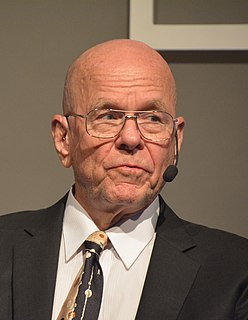A Quote by David Novak
All the questions discussed in the Talmud and related rabbinic literature are normative questions: either they are questions of what one is to think or what one is to do. Every prescribed thought has some practical implication; every prescribed act has some theoretical implication.
Quote Topics
Related Quotes
In general, questions are fine; you can always seize upon the parts of them that interest you and concentrate on answering those. And one has to remember when answering questions that asking questions isn't easy either, and for someone who's quite shy to stand up in an audience to speak takes some courage.
We have a word game in English called "Twenty questions." To play Twenty Questions, one player imagines some object, and the other players must guess what it is by asking questions that can be answered with a "yes" or a "no." I imagine every language has a similar game, and, for those of us who speak the language of science, the game is called The Scientific Method.
The great philosophers of the 17th and 18th centuries did not think that epistemological questions floated free of questions about how the mind works. Those philosophers took a stand on all sorts of questions which nowadays we would classify as questions of psychology, and their views about psychological questions shaped their views about epistemology, as well they should have.
I'm so much more gratified by my life now that I have an expertise. I wake up every day thinking about a fairly small set of scientific questions all related to the psychology of achievement, and I'll never get bored of those questions. That's something I couldn't say to you when I was 22 or 25 or probably even 31.
I did answer all of the questions put to me today, ... Nothing in my testimony in any way contradicted the strong denials that the president has made to these allegations, and since I have been asked to return and answer some additional questions, I think that it's best that I not answer any questions out here and reserve that to the grand jury.
This clarity made me able to behave normally, which posed some interesting questions. Was everybody seeing this stuff and acting as though they weren't? Was insanity just a matter of dropping the act? If some people didn't see these things, what was the matter with them? Were they blind or something? These questions had me unsettled.






































